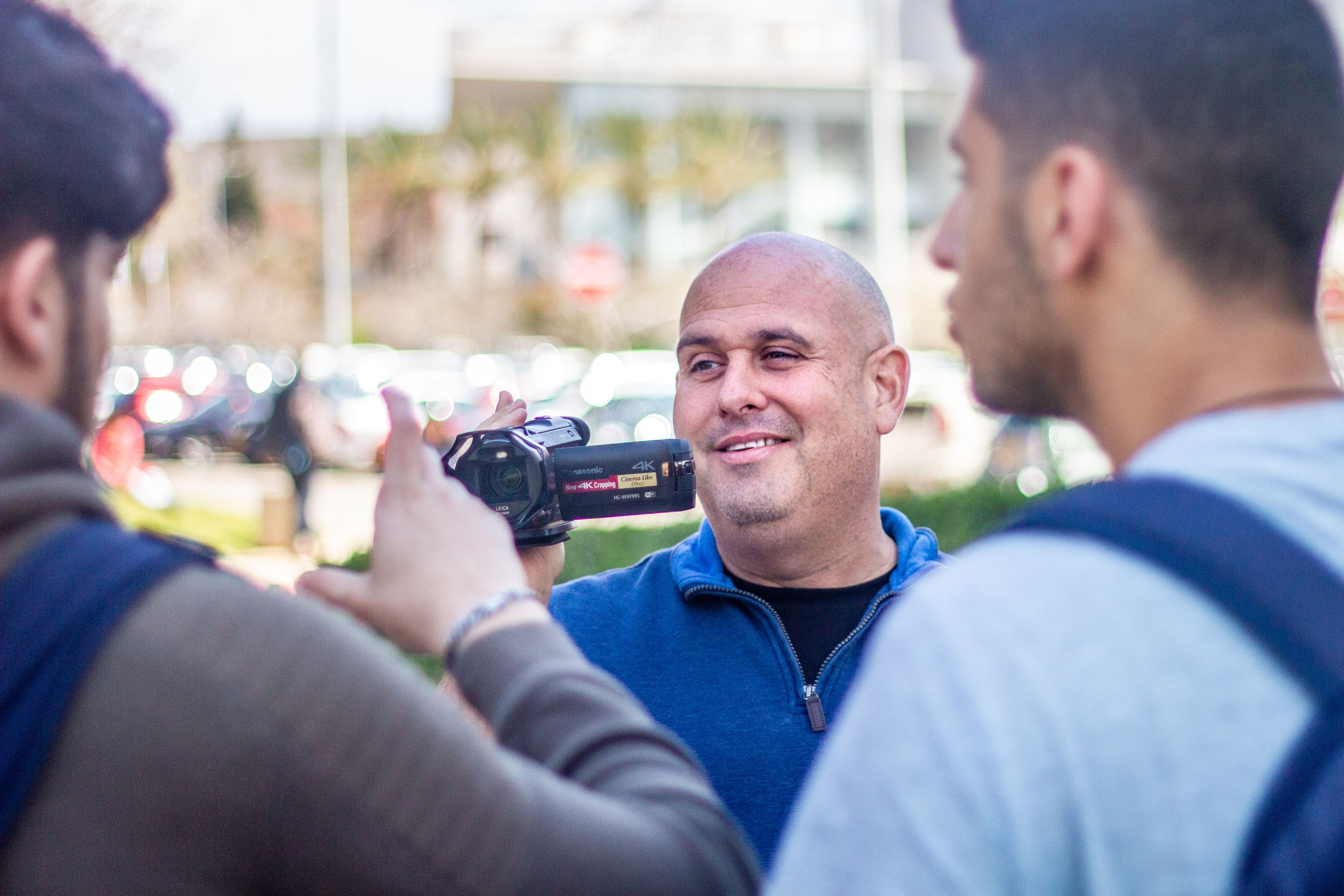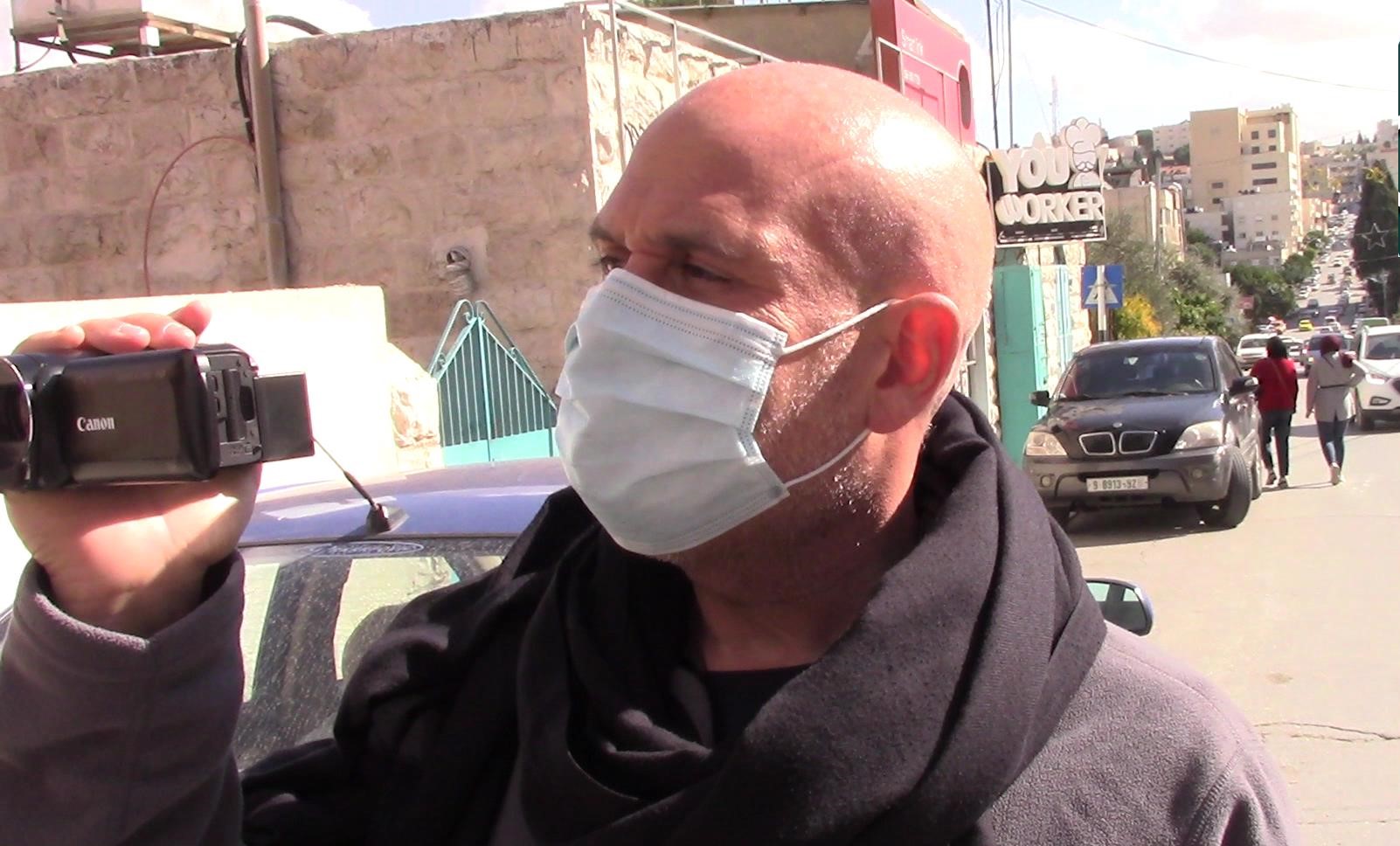Ask Israelis, ask Palestinians – beyond black and white

Anyone, anywhere can send you a question (askisraelis@gmail.com or askpalestinians@gmail.com). Do you remember the first one you filmed?
Corey Gil-Shuster: There was a group of thirty or so people and they were so sure about everything. Someone said something about a one-state-solution, and I thought great, how can I turn that into a question? So first I asked people in Tel Aviv, on the street where I live: the greengrocer and other locals. I had no experience with editing, but once I had put the interviews together in digital form I realised how powerful this could be when making sense of a conflict situation.
So did you go straight to the West Bank or East Jerusalem to put the same question to Palestinians?
Gil-Shuster: It took me a few months to do it. I had only been there as a tourist before. So I asked a few Palestinians whether I could come to their village to try out my project. The first videos I filmed there were very poorly translated; the work was done by friends who just wanted to help out. So I hired a professional translator.
Some of the questions are quite provocative. Do you explain yourself and the project first? How do you avoid merely getting a lot of angry reactions?
Gil-Shuster: I don’t like to provide too much information. So I just tell them that I have a project on YouTube that aims to answer people's questions from outside Israel and would they be prepared to answer a question on camera? It‘s really important that they understand it will be made public.
Israelis are less bothered about being filmed and more concerned about the embarrassment factor – how do they look, is their hair okay, that kind of thing. Palestinians worry about whether going on the record in public could be dangerous, so I‘m very careful of their safety. That‘s really all I do.
"Some questions are really awful"
It sounds easy. Is there no mistrust?
Gil-Shuster: I think they assume I will ask them a trivial question; they don't expect politics. Sometimes I see this look in their eyes when I ask them a question. And, honestly, some of the questions I get sent are really awful.
For instance?
Gil-Shuster: The worst one I had to put to Israeli Jews was: "Why do you treat Palestinians the way the Nazis treated the Jews?" It was really hurtful for me to ask that, but I did, saying this is not my question, but here it is. Sometimes interviewees look shocked, but I think it is important for them to understand that there are people outside who have questions, even if they don’t think the questions are legitimate. Sometimes people will say I don’t want to answer that question, which is fair too.Even after one thousand videos, are there still new things to discover?
Gil-Shuster: Absolutely. I‘m learning all the time. It took me two to three years to realise the Palestinian understanding of the occupation is different to that of a Canadian living in Tel Aviv. Many Palestinians regard Jaffa and Haifa as occupied too. Quite often, people speak using the political slogans that support their perspective. One major goal in conflict resolution is understanding what the other side is saying – what their terms of reference are. Things are never simply black or white.
How randomly do you choose respondents? I wondered a bit that a lot of Israelis you asked were sitting at home, while the Palestinians you interviewed were mostly on the street. The Israelis must have known before that you were, right?
Gil-Shuster: I have a rule: if I go to family members of a friend, I usually ask them one question, but none to which I know what they will answer. Among Palestinians there is a bigger separation between the public and the private sphere. You don’t invite somebody into your home unless you know them. But if possible, I like to visit them in their homes too.

Few mask-wearers in Bethlehem and Hebron
How have you managed your project during the pandemic? Were you able to go out asking questions during 2020?
Gil-Shuster: I did when coronavirus levels were at a low level. I interviewed people in Tel Aviv, as well as in Bethlehem and Hebron, where most people didn’t even wear a mask, which made me very nervous. Basically I stayed outside, not going into people‘s offices or homes.
When watching your videos there seem to be two kind of questions: either they are related to the conflict, like why Israelis hate Palestinians or vice versa, or they reflect a kind of curiosity about the other side, their religion, their way of life.
Gil-Shuster: The most common questions I receive are about religion, which I didn’t expect at first. Such as Jews think about Jesus, or about Muhammad. Where possible, I try to connect them to the conflict. I also try to inject a human aspect into the discussion. If I have one goal, it is to humanise the conflict.Do most of the questions come from abroad?
Gil-Shuster: The questions mostly come from Western Europe and North America, a few from South America and some from the Muslim world. But only a tiny minority are submitted by Israelis and Palestinians.
But you do the follow-ups, so those questions are your own.
Gil-Shuster: I try to put myself in the position of a person who doesn’t live here, someone from – let’s say – Germany, India or the USA. If respondents say we will never give up our land, I ask what if you were to be given a million dollars, or what if your grandchildren could live in peace with a state of Palestine created in the West Bank, just to see whether they will shift from their position, even just a little bit.
Extreme points of view on both sides
Do you ever go to Palestinian refugee camps or to radicalised West Bank settlements like Itamar?
Gil-Shuster: I do go to Itamar and I also go to the refugee camps, although not much as I would like, because my translators are usually afraid going into the camps – they see them as lawless. So we try to ask people at the entrance. Gaza is the only place I’m not allowed to go. But otherwise I have no problem going anywhere.
With all the answers you have received over the years, do you believe the conflict can be resolved; that people would be ready for peace, if the politicians could get their act together?
Gil-Shuster: If the politicians: there‘s your problem. You need leaders with vision. And at the moment, none of them – whatever their allegiance – has any idea of how to proceed. I can’t see any solution right now, but personally I would accept any solution that the majority on both sides were prepared to accept. I regard the two-state solution as the best one, because it is the solution everybody understands, though ultimately, a confederation might make more sense.
According to opinion polls, the majority of Palestinians think the two-state solution is no longer practical or realistic, owing to settlement expansion. Have you seen a shift in their opinions over the years?
Gil-Shuster: There used to be a majority in favour of two states on both sides, but not anymore. My point is, how does each side understand it. For example: if the Palestinians I talk to are in favour of one state, I suggest that Jews from France or the U.S. could come and shop in Hebron, because the city is holy to them. Then I get the answer: "No, that‘s impossible, the one state is for us – Palestine is Palestine. But if the Jews want to live under us, that‘s okay." That is a very mainstream opinion.
But you’ll also find a similar one among Israelis. There are Israelis who say it is all Israel. So then I ask them whether they would give the Palestinians citizenship and they say, "maybe". But when I say, could Palestinians come and shop in Tel Aviv, they say, "No, no, impossible". The main thing I have learnt over the course of the project is that people don’t even understand what they are supporting.
So there is a similar pattern. But what is the main difference between Israelis and Palestinians answering your questions?
Gil-Shuster: The Israelis assume they‘re always going to have power, meaning they have to retain control over the situation. When Palestinians answer, I think they are considering what their families would think is the right way to answer – what is socially acceptable. They feel they have to come across as very tough. They know they have no power. All they have is their ego, the confidence to say this is mine, because otherwise they would lose their identity.
What are your plans?
Gil-Shuster: I hope to go to the Arab Emirates (the UAE) in spring 2021 to ask questions there. After all, not everything is about the Israeli-Palestinian conflict, there is also the issue of peace in the Middle East. I would also love to go to Morocco and if possible, even to Lebanon, because I believe we have a lot in common.
Interview conducted by Inge Gunther
© Qantara.de 2021
Corey Gil-Shuster is director of the International Program in Conflict Resolution and Mediation at Tel Aviv University.
Those wishing to pose a question to the Ask Project can do so by writing to the following addresses: askisraelis@gmail.com or askpalestinians@gmail.com
